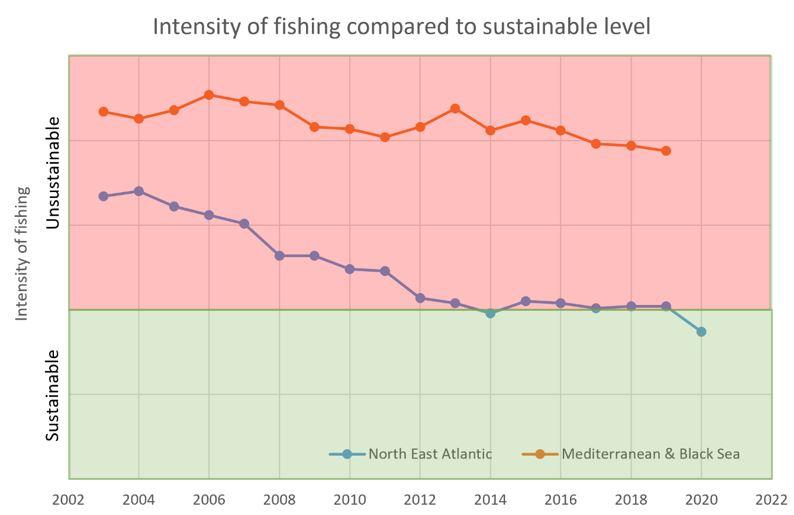
The figures, as assessed by independent scientific agencies, show that conservation efforts are further bearing fruit and the EU fisheries policy has been delivering in reducing overfishing in European waters. At the same time, further efforts are still needed to protect marine resources, both through maintaining high levels of ambition within the EU and by striving to achieve the same high standard in the work with non-EU countries, like Norway, UK and the Coastal States.
The stocks in northeast Atlantic areas are, on average, within levels that deliver the highest sustainable yields into the future (called ‘maximum sustainable yield', or MSY). For the Mediterranean, the situation has further improved but there is still a long way to go. In the Baltic Sea, due to eutrophication, low oxygen levels in the water are hindering the normal growth and reproduction of fish and protective measures have been put in place.
Commissioner for Environment, Oceans and Fisheries Virginijus Sinkevičius, said: “After many years of work, we are seeing positive trends: more fish in the sea, growing to maturity, less fuel used during catch and techniques used with less environmental impact. Fishermen and women, and particularly the younger generation, are now more aware and willing to follow scientific advice about both the quantity of the catch and the sensitive species that need protection. We need to keep up our efforts in all areas but especially in the Baltic and the Mediterranean, and must do a better job protecting sensitive species and habitats as in the long run this will bring us all more fish on the table and thriving fisheries communities. I am counting on the support of the industry and Member States to achieve that.”
Setting priorities for 2023
In today's Communication, the Commission set out its agenda for the next year:
• Better management of fisheries in the Mediterranean basin, building on achievements in the Western Mediterranean and in the Adriatic Sea;
• Proper implementation of the landing obligation;
• Better data from surveys to improve the science advice and economic analyses;
• More actions to protect the marine ecosystems.
In the Mediterranean Sea, where the intensity of fishing is overshooting sustainable levels by nearly 100%, more reductions are needed. Strong efforts will be aimed at further implementing the Western Mediterranean multiannual plan and measures adopted by the General Fisheries Commission for the Mediterranean. Improved conservation measures for the Adriatic Sea, in order to reduce the intensity of fishing and increase long-term yields, will feature prominently in the 2023 fishing opportunities.
In line with the priorities set for 2023, Member States will need to step up the enforcement and control of compliance with the landing obligation and eliminate discards by avoiding unwanted catches. In particular, they should use suitable modern control tools, such as remote electronic monitoring systems, which are the most effective and cost-efficient means to control the landing obligation at sea. The Commission will continue to work with the European Parliament and Council to reach an agreement on the revised fisheries control system, which can facilitate the use of these tools.
The Commission will also continue to work towards achieving sustainability targets in all areas, including in partnership with neighbouring states and cooperation in international fisheries management organisations, and will soon publish an action plan to conserve fisheries resources and protect marine ecosystems.
War in Ukraine: cost for EU-27 fishing fleet could cut profits by €300 million
Recent months have been very challenging for EU fisheries. Marine fuel prices have nearly doubled following Russia's military aggression against Ukraine, and this has disrupted fishing activity. Fisheries close to Ukraine have had to cease operations for security reasons. The high operating costs have led to some operators staying in port. Provisional figures suggest that if energy prices remain at the current level, the EU fishing fleet would overall lose €300 million in operating profit in 2022.
The EU facilitated the use of crisis support under the European Maritime, Fisheries and Aquaculture Fund (EMFAF) and adopted a temporary crisis framework for state aid to support the fishing, aquaculture and processing sectors. An additional support package has been proposed by the Commission through an amendment to the European Maritime and Fisheries Fund (EMFF), which is now with the European Parliament and the Council for their approval.
Next steps
Member states, Advisory Councils, the fishing industry, non-governmental organisations and interested citizens will be invited to take part in a public consultation between June and the end of August and to express their views on the fishing opportunities for 2023.
After the consultation, the Commission will table its proposals for Fishing Opportunities Regulations for 2023 in the Atlantic, the North and Baltic Seas, as well as the Mediterranean and Black Seas. The proposals take into account the multi-annual plans and are based on scientific advice provided by the International Council for the Exploration of the Sea (ICES) and other independent bodies, as well as the economic analysis provided by the Scientific, Technical and Economic Committee for Fisheries (STECF).
The proposals will also incorporate adjustments resulting from the implementation of the landing obligation. Finally, the Council will discuss the Commission's proposals and establish the allocation of fishing opportunities.
Background
Every year, the Commission publishes a Communication outlining progress on the situation of fish stocks and launching a wide public consultation on the fixing of annual fishing opportunities for the following year. This Communication assesses the progress made by the EU towards sustainable fishing and reviews the balance between fishing capacity and fishing opportunities, the sector's socio-economic performance and the implementation of the landing obligation. It also sets out the rationale for the proposal on fishing opportunities for the following year.
For more information
Communication “Towards more sustainable fishing in the EU: state of play and orientations for 2023”
Details
- Publication date
- 1 June 2022
- Author
- Representation in Cyprus
